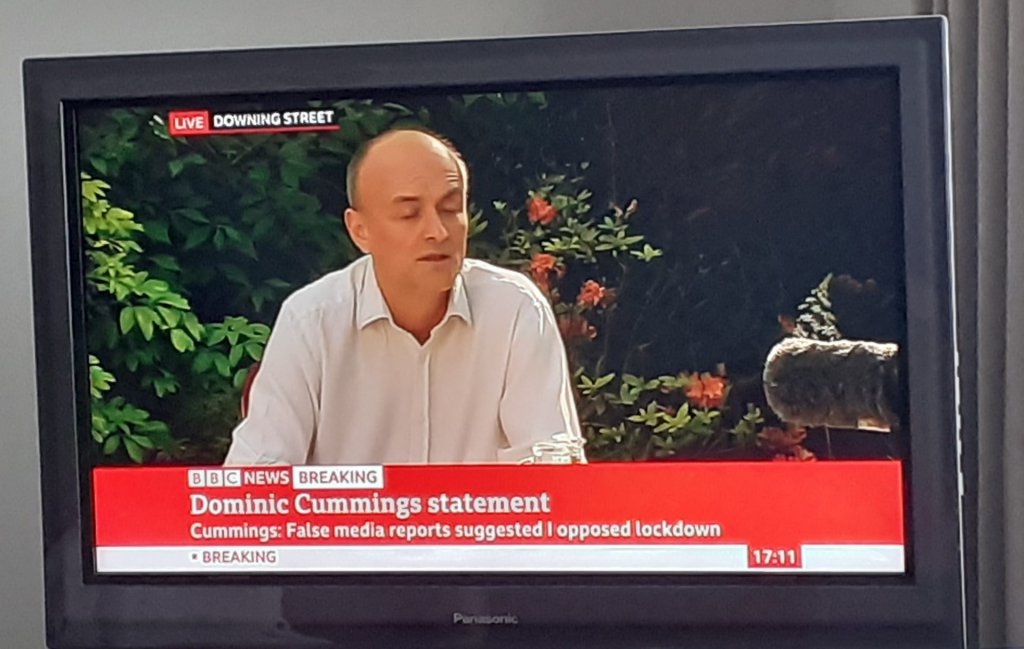Dominic Cummings, the principal adviser to UK Prime Minister Boris Johnson, and the driving force for Brexit and the purchase of the OneWeb satellite constellation, left Number 10 Downing Street in November after his resignation was forced by what had been the UK government equivalent of a “palace intrigue”. Cummings downfall had been preceded by the departure of his ally, Lee Cain who was No 10’s Communications Director. Space fan Cummings, who was seen as both an intellectual and a Machiavellian, wanted to challenge the orthodox views prevalent in politics and the civil service, but one who made many enemies as he did so. And it was this that ultimately led to his demise.

Dominic Cummings tries to explain his “eye test via driving” during May 2020. Courtesy: BBC via David Todd
The UK space industry itself will have mixed feelings about Cummings’ departure. It was not in favour of Brexit – the UK’s departure from the European Union (EU) – which Cummings masterminded, and yet it appreciated him being a proponent of the US space industry – one who with direct access to the UK Prime Minister. It was Cummings who convinced the UK government to invest in the nearly defunct OneWeb satellite constellation, with an eye its possible use as a carrier for a GPS-style navigation payload as a replacement the EU Galileo system which the UK would be excised from after Brexit. However, while the OneWeb decision caused admiration for its audacity, it also resulted in criticism over the idea’s lack of technical practicality, and over the fact that few government departments were consulted over the plan. In effect, they had been short-circuited from the decision making – a Cummings’ modus operandi.
Cummings, who admits to being inspired by the former maverick US air force officer and strategist, John Boyd, whose energy-manoeuvrability theory directly resulted in the hugely successful F-16 fighter jet, and in being influenced by NASA’s successful Apollo human lunar landing plan created by George Mueller, was a noted intellectual who wanted to make root and branch changes within the government and civil service. This was planned with the understandable intention to reduce government bureaucracy and red tape, and to introduce new thinking. And yet, in wanting to challenge the orthodoxy Cummings became a hated figure as he ruthlessly removed any opponent – ranging from junior advisers to senior members of the cabinet and civil service – standing in his way, while others, including senior Conservative ministers and MPs were reportedly frozen out of government decision making.
Likewise, Cummings’ “the end justifies the means” strategy resulted Prime Minister Boris Johnson choosing to disregard constitutional procedure and national law via his government’s attempt to prorogue (suspend) parliament (it was later ruled illegal by the UK’s Supreme Court) and to controversially prepare to intentionally break international law by breaking an international agreement with the EU.
In the end, Cummings’ “Cabal” was defeated by another equally ruthless faction within No 10 which was apparently (and surprisingly) led by the Prime Minister’s fiancée Carrie Symonds, with the help of the newly appointed spokesperson for the Prime Minister, Allegra Stratton.
While Cummings has many detractors, nevertheless, it has to be noted that the Johnson-Cummings Brexit strategy, combined with the poor tactics and leadership of the opposition parties, resulted in the EU referendum being settled in favour of Brexit and the Conservatives subsequently winning the General Election with a large majority.
In addition, Cummings is credited with being the man who convinced a “dithering” Prime Minister to accept the need for a lockdown during the Coronavirus epidemic – a move which probably saved thousands of lives, the only regret being that he did not manage to do it sooner.
Actually, their was another rather obvious regret – one for Cummings himself – after he was caught breaking the lockdown’s own rules in a jaunt from London to his second home in Durham during May, and in a secondary car trip to Barnard Castle nearby. His excuse of taking a drive “to test his eyesight” made Cummings an object of national ridicule and resulted in Prime Minister Boris Johnson receiving a lot of flak for not firing him at the time.







